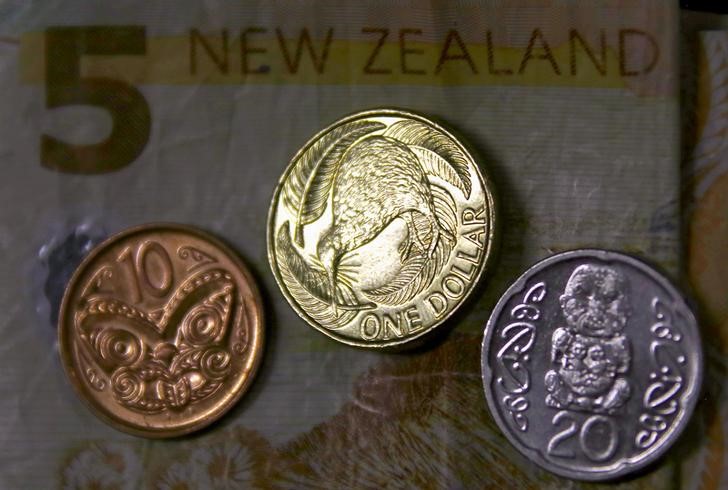By Swati Pandey and Charlotte Greenfield
SYDNEY/WELLINGTON, Aug 8 (Reuters) - The New Zealand dollar languished near three-week lows on Tuesday as investors unwound long positions fearing the country's central bank could turn more dovish at its policy review this week.
The Reserve Bank of New Zealand (RBNZ) is all but certain to leave cash rates at a record low 1.75 percent on Thursday and analysts suspect policymakers will reinforce the need for low rates, given sagging inflation. NZ/POLL
The New Zealand dollar NZD=D4 was down at $0.7354, having lost 0.75 percent overnight in its largest daily drop in almost two months.
The kiwi had risen more than 10 percent in the past three months, a big factor compressing inflation.
"The fall (in the kiwi) likely reflects traders reducing net long positions ahead of the monetary policy statement, which isn't expected to be supportive to the NZD, with inflation tracking lower than the RBNZ projected back in May," said Jason Wong, BNZ senior markets strategist.
An RBNZ survey on Monday showed inflation expectations for two years ahead had slipped to 2.09 percent, from 2.17 percent in the second quarter. the Tasman Sea, the Australian dollar AUD=D4 held at $0.7921, within sight of a recent two-year peak of $0.8066.
It has been trading in a tight range of $0.7892-$0.7980, after repeatedly failing above the crucial $0.8000 mark. It is up 6.7 percent since June.
The Aussie pulled back briefly after weaker-than-expected trade data from China which showed exports rose 7.2 percent from a year earlier and imports grew 11 percent. Aussie has found support from a recent run of upbeat domestic indicators.
A measure of Australian business conditions soared to a 9-1/2 year high in July and profits stayed strong. This follows a monthly gain in job advertisements on Monday, suggesting employment was rebounding.
"The global economy has improved, interest rates are low, wage pressures are contained and consumers are spending. So business conditions are the best in almost a decade," said Craig James, chief economist at CommSec.
"The only real negative has been the recent appreciation of the Aussie dollar."
The rise in the Aussie is one reason markets see little likelihood of an interest rate hike from the Reserve Bank of Australia, even though it is worried about speculation in the housing market and high household debt.
Australian government bond futures were mixed, with the three-year bond contract YTTc1 down 1 tick at 98.060. The 10-year contract YTCc1 inched 1 tick higher to 97.3700.
New Zealand government bonds 0#NZTSY= gained, sending yields 7 basis points lower at the long end of the curve.
